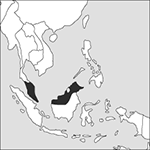
Source: MAPS IN MINUTES™ © RH Publications (1997)
Capital:
Kuala Lumpur
Area:
329,847 sq km (127,355 sq miles)
Population:
29,628,392 (2013 est)
Currency:
1 ringgit=100 sen
Religions:
Muslim 60.4%; Buddhist 19.2%; Christian 9.1%; Hindu 6.3%
Ethnic Groups:
Malay 50.4%; Chinese 23.7%; indigenous 11.0%; Indian 7.1%
Languages:
Malay (official); English; Chinese; Tamil; minority languages
International Organizations:
UN; Commonwealth; Non-Aligned Movement; Colombo Plan; ASEAN; WTO
A country in south-east Asia, having two parts, West and East, separated by the South China Sea.
Physical
East Malaysia comprises Sarawak and Sabah in the north and north-west of the island of Borneo. West, or Peninsular, Malaysia comprises the former Federation of Malaya and occupies the southern end of the Malay Peninsula, extending south from the south-east Asian mainland and bounded on the north by Thailand and on the south by Singapore; it has a south-western coast on the Strait of Malacca.
Economy
Crude oil, gas, electronics, palm oil, and rubber are important exports, with Malaysia being a leading producer of rubber and palm oil. Other mineral resources include bauxite, iron ore, and copper. Malaysia has diversified its economy since the 1970s, when it was a raw-materials producer, and the government is encouraging further investment in the medical and pharmaceutical industries as well as high technology and financial services. The country is actively seeking to reduce its dependence on oil and gas, which provided about a third of government revenue until the oil price slump in 2014. The government is removing domestic energy subsidies and has also introduced a sales tax to bolster its finances.
History
Established in 1963, the Federation of Malaysia originally included Singapore but it was forced to secede in 1965 because of fears that its largely Chinese population would challenge Malay political dominance. Brunei refused to join the Federation. The establishment of Malaysia was first suggested (1961) by Tunku Abdul Rahman, who became its first Prime Minister (1963–70). The Federation aroused deep suspicion in Indonesia, and provoked President Sukarno’s policy of confrontation (Konfrontasi), resulting in intermittent guerrilla war in Malaysia’s Borneo territories, which was only defeated with Commonwealth military assistance (1963–66). In 1969, inequalities between the politically dominant Malays and economically dominant Chinese resulted in riots in Kuala Lumpur, and parliamentary government was suspended until 1971. As a result, there was a major restructuring of political and social institutions designed to ensure Malay predominance, the New Economic Policy being launched to increase the Malay (bumiputra) stake in the economy. The largest single political party remained the United Malays National Organization (UMNO), which had been created by Tunku Rahman. Since 1971 this has ruled in uneasy alliance with the Malaysian Chinese Association and some other ten parties in a coalition, the National Front. Mahathir bin Mohamed became its leader and Prime Minister in 1981. A leading member of the Association of South-East Asian Nations, Malaysia replaced the New Economic Policy in 1991 by a New Development Policy, whose aim was to diversify the economy. A financial and economic crisis in 1997–98 led the government to expel two million foreign workers. Mahathir bin Mohamed stepped down as Prime Minister in 2003 and was succeeded by Abdullah Ahmad Badawi. Badawi resigned in 2009 following criticism for failing to curb corruption and was succeeded by Najib Razak, who was re-elected in 2013. From 2015 Najib had to defend himself repeatedly against accusations of corruption, and the 2018 election saw the National Front lose its majority for the first time in nearly 50 years. Pakatan Harapan became Prime Minister in place of Razak, who was arrested on multiple charges.
- macroecology
- macroeconometrics
- macroeconomic policy
- macroeconomics
- macroeconomic trilemma
- macroevolution
- macrofauna
- macrogenerator
- macroinstruction
- macromolecular coordination chemistry
- macromolecular crystal
- macromolecule
- macronutrient
- macrophage
- macrophagous
- macrophyll
- macropinocytosis
- macroprocessor
- macropygous
- macroscopic
- macrospicules
- macrotidal
- macroturbulence
- macro virus
- macula